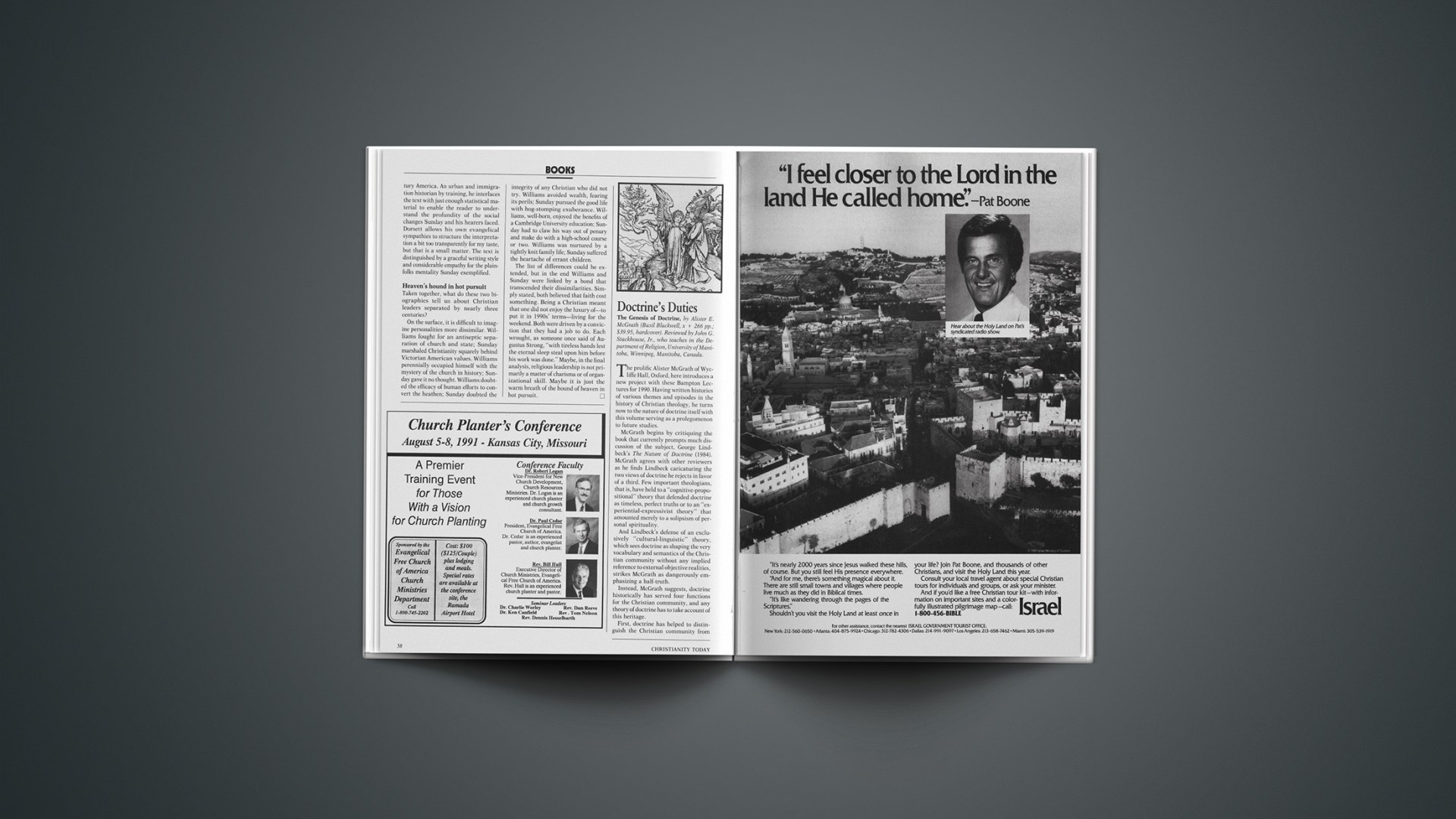The Genesis of Doctrine, by Alister E. McGrath (Basil Blackwell, x + 266 pp.; $39.95, hardcover). Reviewed by John G. Stackhouse, Jr., who teaches in the Department of Religion, University of Manitoba, Winnipeg, Manitoba, Canada.
The prolific Alister McGrath of Wycliffe Hall, Oxford, here introduces a new project with these Bampton Lectures for 1990. Having written histories of various themes and episodes in the history of Christian theology, he turns now to the nature of doctrine itself with this volume serving as a prolegomenon to future studies.
McGrath begins by critiquing the book that currently prompts much discussion of the subject, George Lindbeck’s The Nature of Doctrine (1984). McGrath agrees with other reviewers as he finds Lindbeck caricaturing the two views of doctrine he rejects in favor of a third. Few important theologians, that is, have held to a “cognitive-propositional” theory that defended doctrine as timeless, perfect truths or to an “experiential-expressivist theory” that amounted merely to a solipsism of personal spirituality.
And Lindbeck’s defense of an exclusively “cultural-linguistic” theory, which sees doctrine as shaping the very vocabulary and semantics of the Christian community without any implied reference to external objective realities, strikes McGrath as dangerously emphasizing a half-truth.
Instead, McGrath suggests, doctrine historically has served four functions for the Christian community, and any theory of doctrine has to take account of this heritage.
First, doctrine has helped to distinguish the Christian community from non-Christian alternatives and, furthermore, one Christian group from another (“doctrine as social demarcation”).
Second, it has helped to clarify and explain the essential elements of the Christian story (“doctrine as interpretation of narrative”).
Third, it has helped to articulate to both Christian and non-Christian audiences the nature of Christian piety (“doctrine as interpretation of experience”).
And finally, it has helped to assert the reliability of revelation (“doctrine as truth claim”).
McGrath then plunges into the river of history to demonstrate that all human knowledge, doctrine included, is “condemned to history.” He undertakes a survey of typical Western views of the authority of the past in the Renaissance, Reformation, Enlightenment, and nineteenth century to conclude that all thought—including all attempts to articulate, critique, and reformulate Christian doctrine—necessarily reflects historical contexts. One can ignore one’s tradition, one can fight against it, or one can creatively and critically appropriate it, but it remains an inescapable influence.
McGrath’s target here is the modern view, typical of much Western intellectual history since the Enlightenment, that disparages the past and credits only contemporary experience and reason with validity. This presumption of a privileged epistemological vantage point is, according to McGrath, literally presumptuous. All viewpoints are limited and affected by historical contexts; no one has complete objectivity and access to all pertinent data; and the modern secular mind’s overconfidence in its own powers is utterly unjustified.
McGrath counters instead with a double conviction regarding history and Christian doctrine. First, Christian doctrine is history-bound, but so is every other thought system. Therefore, the task for Christian thinkers is not to try vainly to escape tradition but, in fact, to make the best of it.
Second, Christian doctrine is in the nature of the case bound up with history since it derives from the biblical narrative of God’s saving acts, and especially God’s acts in Jesus of Nazareth. Doctrinal criticism, then, must rest upon this historical understanding of Christian faith—rather than upon some abstract system of truths or some ineffable experience or some linguistic conventions, even as it appreciates all of these as part of Christianity as well.
Beyond The Reformation
Many readers of CHRISTIANITY TODAY will find it easy to agree with McGrath, but they should be careful not to agree too quickly. His rejection of the unnecessary severence of Christian doctrine from history so typical of Lindbeck and the “postliberal” school is valid; his attack on modern epistemological hubris is justified; and his championing of a multidimensionally historical understanding of Christian doctrine is echoed by many thoughtful Christians today.
McGrath’s historical survey, however, is a little too neatly edited. He dispenses far too quickly with the views of the Radical Reformation (as he does in his earlier study of Reformation Thought [1988]), caricaturing them only in terms of the extremes of this category. He fails therefore to deal with the drive toward the repristination of New Testatment patterns characteristic of mainstream Anabaptism—an enduring view of Christian tradition that deserves considerable attention.
He also virtually ignores the Catholic Reformation and never mentions Eastern Orthodoxy with their grander appraisals of church tradition. Since this is the view of the majority of the planet’s Christians, it too deserves some analysis. Having thus arranged the historical tableau, he thereby too easily focuses on magisterial Protestantism as the “Christian” context for further discussion.
Surely, though, a thorough treatment of the place of tradition in the “genesis of doctrine” entails analysis of these important varieties, and one hopes McGrath’s scope will broaden appropriately in his subsequent reflection on these issues. One also hopes that McGrath will later—perhaps then freed from the constraints of initially addressing an Oxford audience as here—at least mention the Holy Spirit’s role in the formulation, transmission, and critical appropriation of doctrine.









